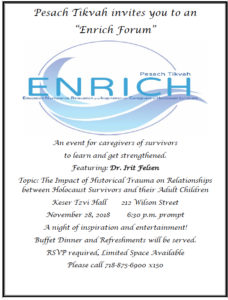On Wednesday November 28 at 6:30 pm, I will be making a presentation entitled “The Impact of Historical Trauma on Relationships Between Elderly Holocaust Survivors and Their Adult Children Caregivers” at the Pesach Tikvah Enrich program in Williamsburg. This event is open to women who are caretakers of a Holocaust survivor parent(s) but reservations are required. See the flyer below for further information.

When elderly parents age and become frail, ill or widowed, adult children are called to provide support and assistance and supervise the complex network of healthcare and other services that need to be accessed and supervised. This is a complex time for the entire family, for the elderly parents who lose their previous independence and control, as well as for the adult children who are pulled by multiple demands and must be responsive to the needs of parents and of their own family. The burden of care for elderly parents is usually not equally shared in the family. One of the adult children usually becomes the primary caretaker who deals with the day-to-day care-taking responsibilities and daily crises, while others might be more remotely involved, for example, in overseeing financial matters. The primary care-taking role is more often than not taken by daughters, in comparison to sons. The literature about care-taking burden and its effects shows that the stress of conflicting responsibilities towards parents and towards their own family, spouses and children might create tensions in multiple areas of life for the adult caretaking children, and studies show that it is associated with various detrimental effects on the psychological and physiological well-being of caretakers. In families of Holocaust survivors, there are some additional issues that amplify the usual difficulties surrounding the care of elderly parents. The literature has shown that a history of prior trauma influences the way people age, and is associated with greater prevalence of many physiological and medical conditions, as well as with a higher risk of cognitive impairment and dementia. Prior trauma can also influence the way in which elderly individuals experience the process of aging, the losses that usually accompany it, and many events that occur as part of their medical care and as part of the changes in their environment. When Holocaust survivors and other trauma survivors age, the might have special needs and special vulnerabilities. At the same time, children of survivors experience their care-taking responsibilities very much against the backdrop of their life-long profound awareness of their parents’ Holocaust experiences and their deep sense of needing to protect the parents from any further pain. However, the particular way each individual child of survivors experiences their care-taking role vis-a-vis their parent will be greatly influenced by the relationships they have had throughout life. Difficult relationships throughout earlier times in life will be associated with greater ambivalence and guilt, which might add to the distress of the caretaker.
This presentation will address the relationships between care-taking women and their elderly Holocaust survivor parents, and will aim at identifying the sources of stress, normalizing some of the feelings that many caretakers express during this difficult journey in the life cycle of Holocaust families, and offer some suggestions about enhancing resilience, self-compassion and self-care.
Irit Felsen

Please come to Miami!
Hi Judy,
I will be happy to take this presentation to Florida if I will be
invited to speak somewhere there by a JFS or a similar organization.
I wish you a very happy Chanukkah!
Yours warmly,
Irit